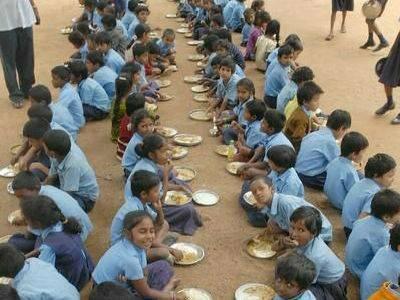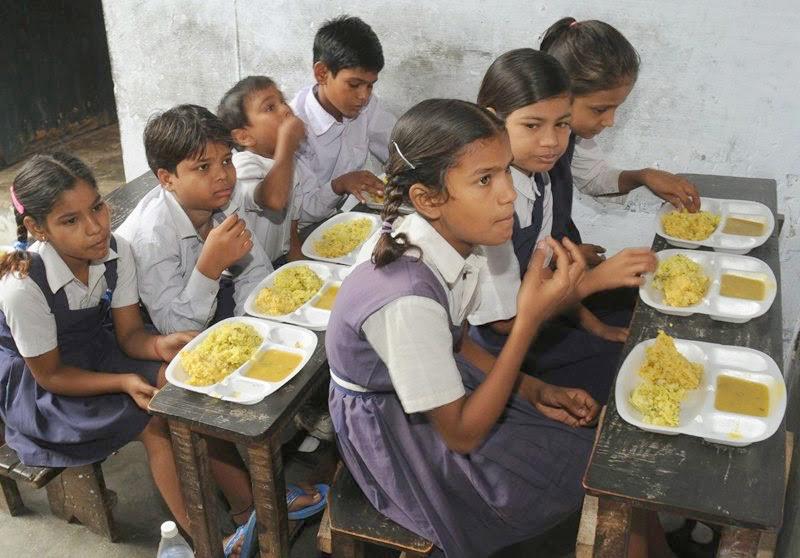According to the World Bank, India is one of the lowest ranking countries in the world for the number of malnourished children, on par with the Sub-Saharan African countries. The Global Hunger Index Report of 2014 further shows India at 120th position among 128 countries for under-weight children.
India is a signatory to the United Nation (UN) Convention on the Rights of the Child (1989), which among other things enjoins the government to combat malnutrition through the provision of nutritious food in schools. It took six more years before the government of India operationalized it through the National Program of Nutritional Support to Primary Education in 1995.

The current mid day meal scheme. Pic: E S Ramamurthy
Both the center and the state governments in India have been adopting a lukewarm attitude to the scheme ever since; they were content initially to provide rice/ wheat at the ration shops in lieu of cooked food in schools citing 'insurmountable' operational problems in providing the latter. It took a Public Interest Litigation (PIL) in the Supreme Court in 2001 to make the government of India agree to this in all its primary schools.
Three more years of litigation followed in the court on every imaginable contentious issue before the scheme took its present shape in 2005. Loaded with rules and regulations imposed by an unhelpful bureaucracy, the scheme is even now plagued with innumerable operational issues that are often beyond the managerial capabilities of the school principals and teachers - leading to shortfalls in delivery.
In spite of the fact that nutrition and health are recognized as key factors in achieving optimum learning levels in the classroom, educational reforms in India rarely cover the child’s nutritional and health status. The mid-day meal scheme is a powerful tool to combat this malady since more than 95% of the vulnerable kids come under the Public Education System. But the government has been consistently failing to use this platform over the last decade.
Published data in the Indian context places the optimum nutritional need of a primary school child in the range of 1500-2000 kilocalories per day. The meal specified under the mid-day meal scheme is however intended to provide just 400 and 750 kilocalories for the lower and upper primary school kids respectively, leaving a huge gap, which is beyond the scope of the parents to fulfill. Even this supply is limited to 200 days in a year. Such an unimaginative approach has resulted in our country languishing at the bottom of the global table, not only in health but also in basic learning levels.

What the mid day meal scheme could be like. Pic: E S Ramamurthy
The scheme under implementation is now facing a financial crisis with the central government slashing its budget from Rs 13200 crores to Rs 9500 crores this year, despite steep increases in input costs. A look at the overall financial picture shows that it is not beyond the capacity of the government, not just to avoid the cut but to increase the allocation of funds for the scheme substantially.
Even if the funds were to be doubled to cover the cost of the supplementary nutrition needed, it would involve only an additional Rs 10000 crores, an amount that is negligible in the context of the overall budget of Rs 1800000 crores and the munificence the government shows routinely to its own staff and other sectors.
Incidentally, the status of children's health from pre-natal to the age of 6 is no less precarious; and the commitment of the government to their welfare under the UN Convention and our own constitution is no less important. The Integrated Child Development Scheme that is supposed to take care of this age group is in shambles; forceful corrective steps are called for here too.
It is recognized that funding of initiatives in sectors like Education and Health is invariably a reflection of the political will of the establishment and their relative priorities; it has little to do with financial constraints.

In an environment where the political will is lacking, nothing short of a mass movement and/ or a PIL in the Supreme Court can be expected to make the government see the reasons.
In this context a petition has been initiated under change.org to persuade the government to restore the cuts in the budgeted expenditure and also to take a fresh look at the entire scheme to bring it in line with the nutritional needs of the child in consultation with its own expert agencies.
An appeal to all those who feel committed to this cause, can we do our bit to make it go viral on the net?No doubt it is a long path but that should not deter one from pursuing it.
As a Chinese proverb puts it: A journey of a hundred miles starts with single step. It is time we took that step to redeem our position in the comity of nations.























